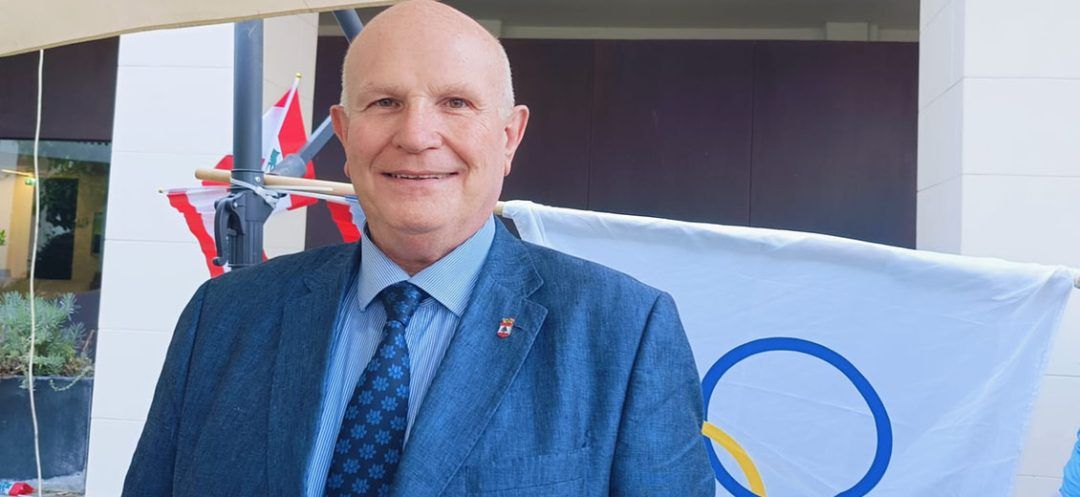
With just a few days to go before the 2024 Olympic Games kick off, the President of the Lebanese Olympic Committee, Pierre Jalkh, granted an exclusive interview to This is Beirut. He looks back at the preparations of the Lebanese who will be representing their country at the Paris Games.
Pierre Jalkh, we're 10 days away from the Paris 2024 Games, what's your take on the overall preparation of Lebanese athletes?
I can tell you that all Lebanese athletes are actively preparing for the Paris Games. At the moment, half of them are abroad, the other half are in Lebanon, but they're all getting ready.
Some are in the United States, others in Germany, others in France. Ray Bassil will be present at the competition site in Châteauroux, well in advance of the competition. It's a very good thing to be able to acclimatize to the environment at the shooting range. Laetitia Aoun is in full preparation between Paris and Beirut. She actively participates in advanced training sessions with top-level coaches.
I don't want to name them all, but I can assure you that they're all getting ready for the Games.
Nine athletes will represent Lebanon at the Paris Games. That's quite a large delegation for Lebanon, isn't it?
Indeed, it's quite a large number for Lebanon. After the qualification system established before the Barcelona Olympic Games in 1992, this is one of the largest delegations of Lebanese athletes.
Of course, each athlete is entitled to a coach and an official with him/her. So the total delegation, including the person in charge, the head of mission and myself with the secretary general, will be around 32 to 33 people.
So Lebanon will be present at the Paris Olympic Games in quite a significant way.
Does Nour Hadid still have a chance of taking part in these Games?
Not really, no. I don't want to go back over the circumstances that led to Nour Hadid being sidelined. For us, as the Olympic Committee, the important thing is that Lebanon is represented by athletics at these Games. We have the right to send an athlete, thanks to the universal places allocated by the International Olympic Committee (IOC), so we might as well make the most of it.
What about government support?
To date, there has been no support from the State, which was to be expected given the financial situation of the country and the government, but even so, a little effort and a little goodwill could have been beneficial for the Lebanese athletes, who will be taking part in the Olympic Games in Paris.
The last time a Lebanese athlete won an Olympic medal was in 1980. What do you think our chances are in Paris?
As far as medals are concerned, we have chances to acquire a medal in Paris. For example, Ray Bassil is fifth in the world. She could make a big splash at these Games and finish in the top three.
Similarly, Laetitia (Aoun), who is 16th in the world, could also claim a medal and be ranked in the top three. The others could also surprise us, you never know.
In any case, we're counting on our athletes and sportsmen and women to spring a surprise in Paris.
Do you have anything to add to the readers of This is Beirut?
I'd like to mention the volunteers who have been trained to act as guides and translators. As you know, the Lebanese are trilingual and will therefore be excellent ambassadors for our country. They will be in contact with delegations from all over the world.
The Olympic Games are the world's biggest sporting event. They take place every four years, and the world's best athletes will be present.
I'd also like to return to the words of Baron Pierre de Coubertin, founder of the modern Olympic Games, who said that the most important thing at the Olympic Games is not to win, but to participate. It's not the triumph that's important in life, but the struggle.
The most important thing is not to win, but to have fought well. These words are very important to us and give us extra motivation.
Pierre Jalkh, we're 10 days away from the Paris 2024 Games, what's your take on the overall preparation of Lebanese athletes?
I can tell you that all Lebanese athletes are actively preparing for the Paris Games. At the moment, half of them are abroad, the other half are in Lebanon, but they're all getting ready.
Some are in the United States, others in Germany, others in France. Ray Bassil will be present at the competition site in Châteauroux, well in advance of the competition. It's a very good thing to be able to acclimatize to the environment at the shooting range. Laetitia Aoun is in full preparation between Paris and Beirut. She actively participates in advanced training sessions with top-level coaches.
I don't want to name them all, but I can assure you that they're all getting ready for the Games.
Nine athletes will represent Lebanon at the Paris Games. That's quite a large delegation for Lebanon, isn't it?
Indeed, it's quite a large number for Lebanon. After the qualification system established before the Barcelona Olympic Games in 1992, this is one of the largest delegations of Lebanese athletes.
Of course, each athlete is entitled to a coach and an official with him/her. So the total delegation, including the person in charge, the head of mission and myself with the secretary general, will be around 32 to 33 people.
So Lebanon will be present at the Paris Olympic Games in quite a significant way.
Does Nour Hadid still have a chance of taking part in these Games?
Not really, no. I don't want to go back over the circumstances that led to Nour Hadid being sidelined. For us, as the Olympic Committee, the important thing is that Lebanon is represented by athletics at these Games. We have the right to send an athlete, thanks to the universal places allocated by the International Olympic Committee (IOC), so we might as well make the most of it.
What about government support?
To date, there has been no support from the State, which was to be expected given the financial situation of the country and the government, but even so, a little effort and a little goodwill could have been beneficial for the Lebanese athletes, who will be taking part in the Olympic Games in Paris.
The last time a Lebanese athlete won an Olympic medal was in 1980. What do you think our chances are in Paris?
As far as medals are concerned, we have chances to acquire a medal in Paris. For example, Ray Bassil is fifth in the world. She could make a big splash at these Games and finish in the top three.
Similarly, Laetitia (Aoun), who is 16th in the world, could also claim a medal and be ranked in the top three. The others could also surprise us, you never know.
In any case, we're counting on our athletes and sportsmen and women to spring a surprise in Paris.
Do you have anything to add to the readers of This is Beirut?
I'd like to mention the volunteers who have been trained to act as guides and translators. As you know, the Lebanese are trilingual and will therefore be excellent ambassadors for our country. They will be in contact with delegations from all over the world.
The Olympic Games are the world's biggest sporting event. They take place every four years, and the world's best athletes will be present.
I'd also like to return to the words of Baron Pierre de Coubertin, founder of the modern Olympic Games, who said that the most important thing at the Olympic Games is not to win, but to participate. It's not the triumph that's important in life, but the struggle.
The most important thing is not to win, but to have fought well. These words are very important to us and give us extra motivation.
Read more




Comments